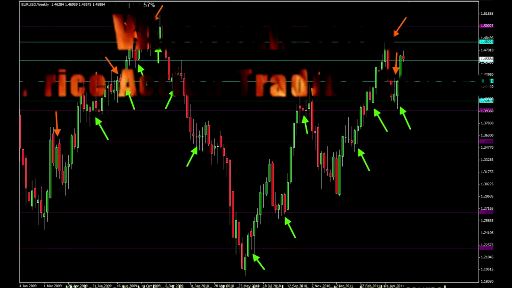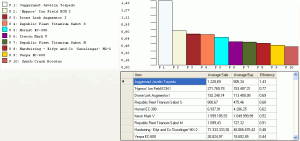What’s trading about
I won’t talk about graphs or pressing buttons here.
This chapter and the next are the core to learn, who will not carve every single sentence of these two chapters in his flesh, won’t become a trader, period. All the rest compared to this chapter is fluff, even the method itself.

Trading is the act of exchanging something, possibly for a profit.
The motto is the well known: “buy low, sell high”.
How to actually implement the motto in practice is the scope of the whole course.
In order to trade we need: “something” to trade, a place where to perform such exchange and adequate tools to deliver such “something”.![]() In EvE it’s easy. We trade where our skills lets us to, usually in a station. We trade any of thousands of EvE items and commodities. The tool we use is the market window and the buy / sell windows.
In EvE it’s easy. We trade where our skills lets us to, usually in a station. We trade any of thousands of EvE items and commodities. The tool we use is the market window and the buy / sell windows.
In the real life markets it’s not as easy but it’s still doable by most people. We trade at a central exchange or through a dealer / broker acting on our behalf. In simple terms, they act as wholesale providers to us, they collect thousands of market orders and forward them to the exchange. For a most precise and valuable description of the whole markets micro-structure, please check the reference book by Larry Harris.
We trade assets represented by contracts, these are real or virtual legally binding contracts stating we own or borrow a certain item / commodity / currency / stock and it’s characteristics (expecially for commodities).
We trade those contracts with appropriate tools called “software  platforms”. These are programs that forward our intention to buy / sell assets to the broker / dealer which in turn will find a best matching counterpart order to settle / will forward it to the exchange.
platforms”. These are programs that forward our intention to buy / sell assets to the broker / dealer which in turn will find a best matching counterpart order to settle / will forward it to the exchange.
Certain legacy markets are somewhat different: instead of software we need to physically cry to other traders, or we need to phone to dealers.
Other markets, typically currency pairs, don’t have a central exchange, we deal with them like “peer to peer” networks (I am simplifying a lot) a la Torrent, e-Mule and so on.
Regardless of the above, the rules were, are and will always be the same:
Buy and resell at a better price for a profit, buy and resell at a worse price for a loss.
Spot price is the only factor, the only protagonist.
Contrary to what some commercial “trading systems” preach, there’s no future to predict, no crystal ball, no magic indicators, no astrology, no voodoo.
There’s Just Price, how it moves right now and why.
In order to profitably trade we:
– Shall put ourselves in a very comfortable and relaxed environment. Be at your best, for the fight is harsh and leaves no prisoners.
– Must read the text ahead skipping no sentence. You WILL pay hugely for every syllabe you skipped.
– Shall work on the proposed exercises and have them corrected. No practice, no profit.
– Must understand that price is the protagonist. Not patterns. Not indicators. Not whatever else. Every additional feature shall serve Sir Price, never the contrary.
– Must understand that markets need interactions. Large traders leave visible visit cards, markets have memory about when demand met offer very well, traders love to use those meeting points to seal their deals.
– Must understand that trading is a zero sum game. Either the seller or the buyer wins, not both. Many must lose for few to handsomely profit. Several sources mention a 90-95% ratio of consistent losers and you are among them by default.
– Must use money we can afford to lose. ![]() Yes, it’s like when you undock in EvE. Trading with meager accounts off borrowed money is the real life equivalent of self podding. Don’t try, period.
Yes, it’s like when you undock in EvE. Trading with meager accounts off borrowed money is the real life equivalent of self podding. Don’t try, period.
– Must understand that you will face ruthless, huge, experienced organizations choking full of professionals whose only reason to exist is to destroy you. There’s no free meal.
– Must understand that trading is always won by information asymmetry. The party with more information wins, it’s just that easy. The method will deal with this. You will literally trail those huge organizations of professionals and win with them.
– Must understand that trading is 80% about yourself, 5% about the method you use, 15% about your money management. You will never be profitable if you don’t learn the proper psychology and mindset. NEVER.
– Must understand that trading is a passive operation. You don’t search for good trades, you spot the good setups and very selectively cherry pick the best. ![]() In EvE you may actively manipulate a market. That’s not trading though, it’s market making, a whole different beast.
In EvE you may actively manipulate a market. That’s not trading though, it’s market making, a whole different beast.
– Have to be ready for the market (money, approach, method and mind wise) but the market must also be ready for us. This does not happen in summer, during holidays, during the close hours and during news. You trade at great risk if the market is not ready.
– Have to understand that capital preservation is of utmost importance. Always be selective and conservative like your life depended on it. Because it does.
– Have to understand that less is more. There’s no need of complicated garbage indicators, price laws stand the centuries. The trader who teached me this does not even have a clock on his charts, he uses his home’s.
– Once you spot the best setup, you must plan the trade first. Then you must trade the plan. If you won’t, you’ll have many big losses. Making a plan is like setting up a nice Chess strategy, when the game resumes you execute it.
– Must train, learn, test, backtest, simulate for months and then keep learning for years. Trading is a difficult profession, it has to be approached like one.
You don’t want heart surgery by a 2 weeks experience rookie surgeon who read “Surgery for dummies”, do you?
Your wallet does not want to be violated by a 2 weeks experience rookie trader who read “Get rich quick for dummies” for $99, does it?
– Must have a completely open mind, willing to read and learn with no prejudice.
– Must be psychologically prepared.